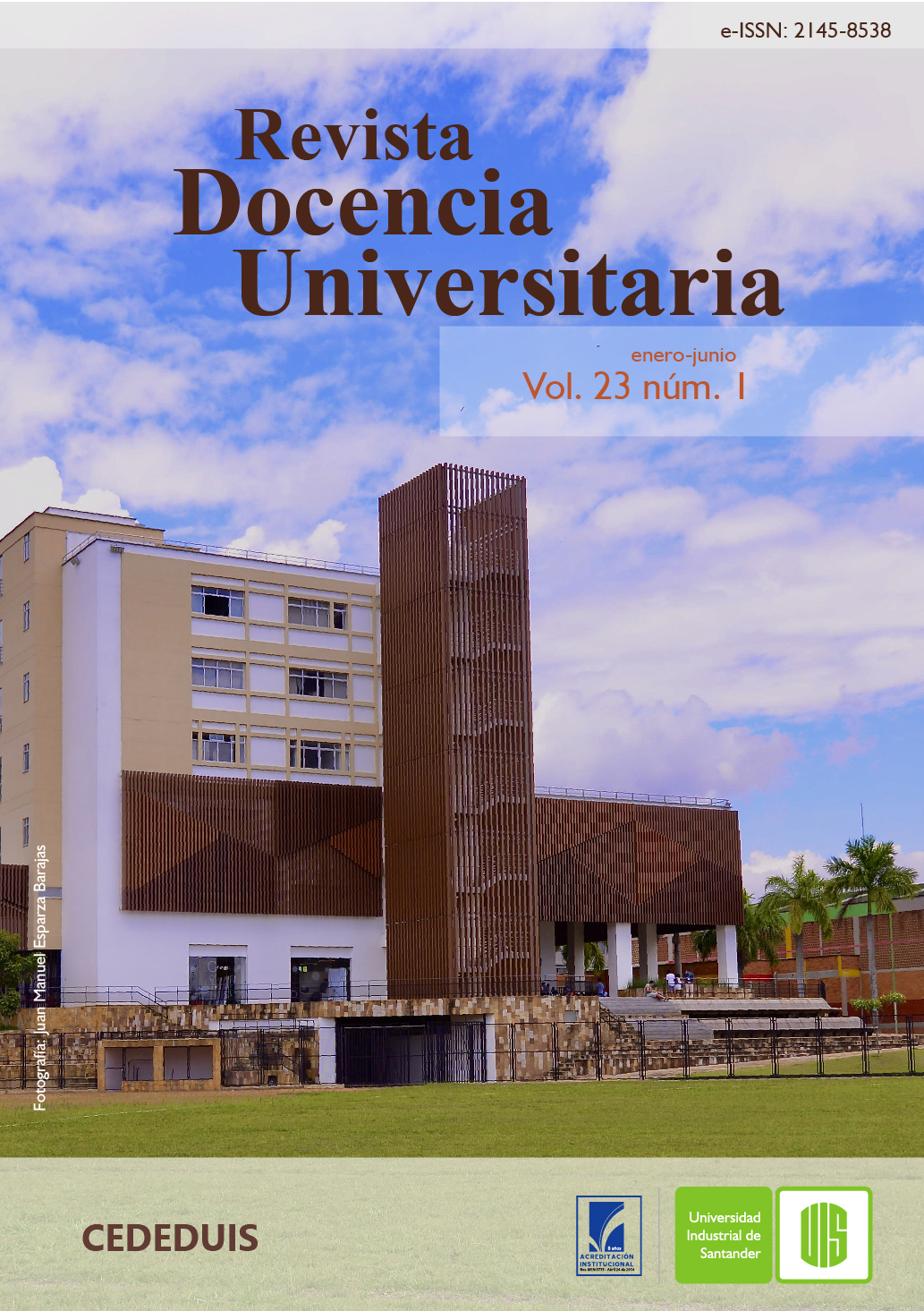Published 2022-07-15
Keywords
- learning,
- challenges,
- gamification,
- genetics,
- scientific thinking
How to Cite
Copyright (c) 2022 Revista Docencia Universitaria

This work is licensed under a Creative Commons Attribution 4.0 International License.
Abstract
immersive learning using gamification represents an opportunity to strengthen scientific thinking skills during the learning of genetic expression, empowering students to understand the processes that establish the functioning of living beings and the molecular-scale relationships between various organisms, through experimentation, rational thinking to solve challenges and the interpretation of results. At the same time they acquire skills in the use of digital tools with immersion processes that allow the representation of reality. For this, the level of competencies determined by the tests of the Colombian Institute for the Evaluation of Education (ICFES) was specified, the learning strategy was designed and applied, relating the thematic contents in the gamified activities and finally the results obtained by students, in search of relationships that would explain how the strategy managed to increase the level of skills observed in the exit test, where there is a 70% reduction in the proportion of students who were initially located in the lowest level of performance , results obtained effect of the repetition of the activities according to the proposed strategy with a confidence level of 90%.
Downloads
References
- Agüero Pérez, M. M., López Fraile, L. A., & Pérez Expósito, J. (2019). Challenge Based Learning as a Professional Learning Model. Universidad Europea and Comunica +A program case study. Vivat Academia, (149), 1-24.
- Andrade, E. (2011). La dualidad análogo digital de la información se ejemplifica en el estudio de las moléculas de RNA. Acta Biológica Colombiana, 16(3) 15-42. Obtenido de http://www.scielo.org.co/pdf/abc/v16n3/v16n3a2.pdf
- Balderrama Campos, J. L., & Padilla Martínez, K. (2019). Developing Scientific Thinking Skills Through Teaching Chemical Reaction With Inquiry Based Teaching. Educación Química, 30(1), 93-110.
- Barata, G., Gama, S., Pires, J., & Gonçalves, D. (2015). Gamification for Smarter Learning: tales from trenches. Smart Learning Environments, 2(10), https://doi.org/10.1186/s40561-015-0017-8
- Bovermann, K., & Bastiaens, T. (2020). Towards a motivational design? Connecting. RPTEL, 15(1), https://doi.org/10.1186/s41039-019-0121-4
- Chamizo, J. A., Izquierdo, M. (2018). Evaluación de las competencias de pensamiento científico. Educación Química, 18(1), 6. doi:10.22201/fq.18708404e.2007.1.65971
- Create Play & Learn S.L. (2021). Educaplay. Obtenido de Educaplay, www.educaplay.com
- Dichev, C., & Dicheva, D. (2017). Gamifying education: what is known, what. Int J Educ Technol High Educ, 14(9), https://doi.org/10.1186/s41239-017-0042-5
- Fleischmann, K., & Ariel, E. (2020). Gamification in Science Education: Gamifying Learning of Microscopic Processes in the Laboratory. Contemporary educational technology, 7(2), 138-159.
- ICFES (2010). Prueba de Biología. En ICFES, ICFES mejor saber - Ejemplos de Pregunta.
- ICFES (2014). Cuadernillo de Preguntas Saber 11.° Prueba de Ciencias Naturales. Bogotá.
- ICFES (2015). Ciencias Naturales. Simulacro Prueba Saber 9° (p 5). Dirección de Evaluación, Icfes. Obtenido de: https://www.instruimos.com/index.awp?awpidf5fbad6a=05810e80f54b76b47383fbb54a15cbe5c6baf37c
- ICFES (2018). Cuadernillo de Preguntas Saber 11 Prueba de Ciencias Naturales. Dirección de Evaluación, Icfes. Obtenido de www.icfes.gov.co
- ICFES (2019). Marco de referencia de la prueba de ciencias naturales saber 11°. Dirección de Evaluación, Icfes.
- ICFES (2020). Informe Nacional de Resultados para Colombia - Pisa 2018. Dirección de Evaluación, Icfes
- Kahoot (21 de junio de 2021). Kahoot. Obtenido de Kahoot: https://kahoot.com/company/
- Morris, B., Croker, S., Zimmerman, C., Gill, D., & Romig, C. (2013). Gaming science: the “Gamification” of scientific thinking. Frontiers in Psychology, 4, 1-16. http://www.frontiersin.org/Psychology/editorialboard
- Sayer, E. et al. (2018). Database resources of the National Center for Biotechnology Information. Nucleic Acids Res, 50(1), 20-26. https://doi.org/10.1093/nar/gkab1112
- Observatorio de innovación Educativa del Tecnológico de Monterrey (2016). Aprendizaje basado en Retos. EduTrends
- Palacín Fernández, M. (2015). Propuesta didáctica para abordar los contenidos de Genética y Biología Molecular en 4° de la ESO utilizando el enfoque de Investigación Dirigida. [Trabajo de maestría]. Gijón, Universidad Internacional de La Rioja, España.
- Sanmugam, M. (2017). Effects of gamification on achievement, engagement and intrinsic motivation among students of different player traits in science learning. [Doctoral dissertation] Universiti Teknologi Malaysia, Faculty of Education.
- Waterhouse, A. B. (2018). SWISS-MODEL: homology modelling of protein structures and complexes. Nucleic Acids Res, 46, 296-303. https://doi.org/10.1093/nar/gky427

